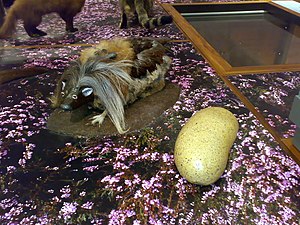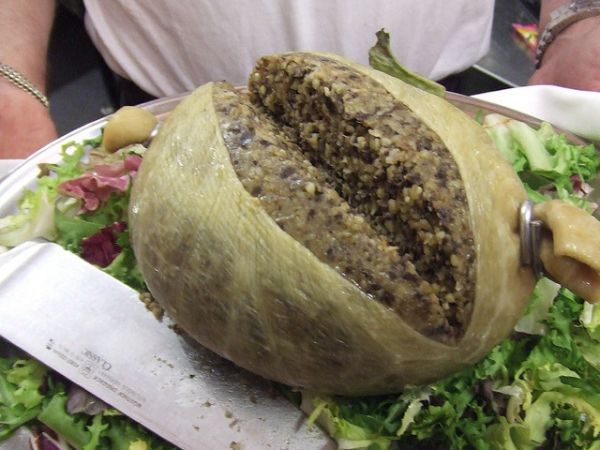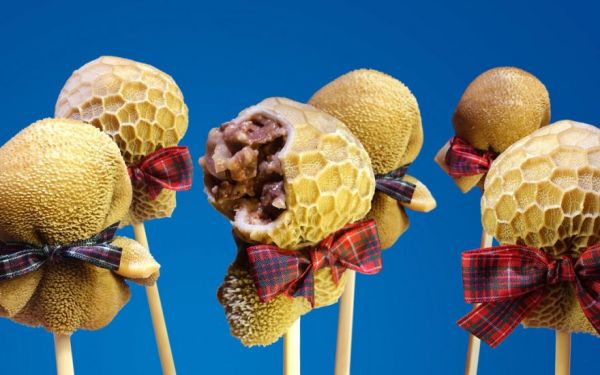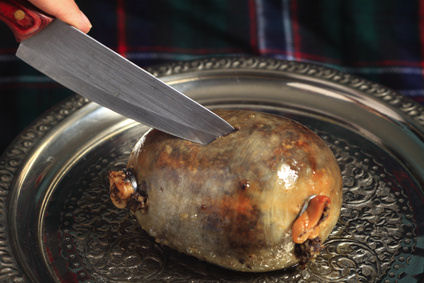 |
| William Wallace |
Scots, wham Bruce has aften led;
Welcome to your gory bed,
Or to victory!
Now's the day, and now's the hour;
See the front o' battle lour;
See approach proud Edward's power—
Chains and slavery!
Wha will be a traitor knave?
Wha can fill a coward's grave!
Wha sae base as be a slave?
Let him turn and flee!
Wha for Scotland's king and law
Freedom's sword will strongly draw,
Freeman stand, or freeman fa',
Let him follow me!
By oppression's woes and pains!
By your sons in servile chains!
We will drain our dearest veins,
But they shall be free!
Lay the proud usurpers low!
Tyrants fall in every foe!
Liberty's in every blow!—
Let us do or die!
Some hae meat and canna eat,
~ Burns ("The Selkirk Grace")
What an antithetical mind! - tenderness, roughness - delicacy, coarseness - sentiment, sensuality - soaring and groveling, dirt and deity - all mixed up in that one compound of inspired clay!
~ Burns, from a 1786 letter to his early patron, Gavin Hamilton:
The address to the haggis
Toast to the haggis
Freedom's sword will strongly draw,
Freeman stand, or freeman fa',
Let him follow me!
 |
| William Wallace played by Mel Gibson in Braveheart) |
By your sons in servile chains!
We will drain our dearest veins,
But they shall be free!
Lay the proud usurpers low!
Tyrants fall in every foe!
Liberty's in every blow!—
Let us do or die!
~ Robert Burns, in the form of a speech given by Robert the Bruce (wiki) before the Battle of Bannockburn (wiki) in 1314, where Scotland maintained its sovereignty from the Kingdom of England. "Wallace" refers to William Wallace (wiki) (the character played by Mel Gibson in the 1995 movie Braveheart), who struggled unsuccessfully in the 1290s to do what Bruce at last accomplished in 1314.
And some wad eat that want it,
But we hae meat and we can eat,
And sae the Lord be thankit.
But we hae meat and we can eat,
And sae the Lord be thankit.
~ Burns ("The Selkirk Grace")
 |
| Battle of Bannockburn |
~George Gordon, Lord Byron (wiki) (1788-1824) (of Robert Burns, diary, December 1813)
"For my own affairs, I am in a fair way of becoming as eminent as Thomas à Kempis, or John Bunyan (wiki); and you may expect henceforth to see my birthday inscribed among the wonderful events, in the Poor Robin and Aberdeen Almanacks, along with the Black Monday and the Battle of Bothwell-bridge."
Today is the anniversary of the birth of Robert Burns (wiki) (1759-1796), Scotland's beloved "prince of poets," in Alloway. Raised on a farm, Burns nonetheless read poetry as a youth, which inspired him to write verse of his own in the Scottish dialect. He first published his poems in 1786, hoping to earn enough money to emigrate to Jamaica, but their immediate success led him to remain in Scotland and become an (unsuccessful) gentleman farmer.
Lionized in Edinburgh, he produced hundreds of lyrics, including such favorites as "My Love is Like a Red, Red Rose," "Auld Lang Syne," "Comin' Through the Rye," and "My Heart's in the Highlands" - as well as such popular poems as "To a Louse" and "To a Mouse" ("The best laid schemes o' mice an' men/Gang aft a-gley.") You can find most of these poems here.
All over the world tonight, Scotsmen will gather to celebrate "Burns Night" with bagpipes, haggis, Scotch whisky, and well-lubricated recitations of their bard's characteristic poems.
Haggis, traditional at these celebrations, is the heart, liver and lungs of a sheep ground up, then boiled inside the sheep's stomach. Yum, right?
These DIY haggis pops are much portable than the full version and probably equally yummy. Instructables member PenfoldPlant made them for a Burns Supper from nice, fresh sheep guts. He even cleaned and prepared the stomach itself, which serves as the coating of these delicious wonders. This step required careful work; he placed a ping pong ball in part of the stomach, then tied off and cut that part off the rest of the stomach. (H/T Neatorama)
The world's largest haggis is the size of a small car and contains:
1,537 lbs of select cuts of pork and pork offal
734 lbs of oatmeal
86 lbs of seasoning
51 lbs of onions
Here are 10 weird varieties of haggis, including haggis ice cream and potato chips.
Here is a typical run through and description of what is involved in a Burns Supper, which apparently is quite structured, and includes (but is not limited to):
Piping in the haggis
The haggis is the crowning glory of a Burns Supper and, suitably, is piped in to an upstanding audience. Traditionally the chef carries the haggis in on a silver platter behind the piper and is followed by the person who will address the haggis.
The address to the haggis
The appointed speaker gives a dramatic rendition of Burns’ Address to a Haggis with a knife at the ready. After apologizing for ‘killing’ the haggis, they then plunge the knife into the haggis and slice it open during the line ‘An' cut you up wi' ready slight'’ meaning 'and cut you up with skill’. The recital ends with the platter being raised above their head whilst saying the triumphant words ‘Gie her a Haggis!’ to rapturous applause. The full address, in original version and modern translation is here - use it to follow along with the video.
Toast to the haggis
The speaker then invites the guests to toast the haggis and everyone, including the chef, raises their glasses and shouts 'The Haggis' before enjoying a dram. The haggis is then piped back out to be prepared for dinner.
The full meal, which always includes mashed neeps and tatties (turnips and potatoes) and a lot of Scotch, is followed by several entertainers interspersed with stories of Burns' life.
 |
| A fictional wild haggis specimen, Haggis scotticus, as displayed in the Glasgow Kelvingrove Gallery, next to a prepared example |
Here's a faux "scientific" article on the problems with reproduction among wild haggis entitled Applications of ultrasonography in the reproductive management of Dux magnusgentis venteris saginati:
Dux magnus gentis venteris saginati is considered to be a Scottish delicacy; however, depleting wild stocks have resulted in attempts to farm them. Selective breeding has been successful in modifying behaviour, increasing body length, reducing hair coat and improving fank (litter) size. However, there are still significant problems associated with the terrain in which they are farmed. This article describes the use of ultrasonography in the reproductive management of this species and the introduction of new genetic material in an attempt to address these problems, with the aim of improving welfare and productivity.
BBC has more on the Battle of Bannockburn.
And, last but not least, Mental Floss has 14 Scots Words from the Works of Robert Burns.
And, last but not least, Mental Floss has 14 Scots Words from the Works of Robert Burns.
Based on Ed's Quotation of the Day, only available via email. If you'd like to be added to his distribution list, leave your email address in the comments.



No comments:
Post a Comment